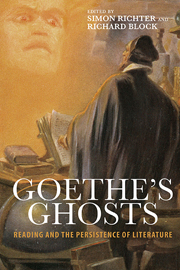Book contents
- Frontmatter
- Contents
- Introduction—Ghosts and the Machine: Reading with Jane Brown
- Part I The Ghosts of Goethe's Past
- Part II The Ghost That Keeps on Giving
- 6 Mephisto or the Spirit of Laughter
- 7 Shipwreck with Spectators: Ideologies of Observation in Goethe's Faust II
- 8 Constructing the Nation: Volk, Kulturnation, and Eros in Faust
- 9 Gretchen's Ghosts: Goethe, Adorno, and the Literature of Refuge
- 10 “I'll burn my books!”: Faust(s), Magic, Media
- Part III Spirited Encounters
- Bibliography of Jane K. Brown's Publications
- Notes on the Contributors
- Index
10 - “I'll burn my books!”: Faust(s), Magic, Media
from Part II - The Ghost That Keeps on Giving
Published online by Cambridge University Press: 05 March 2014
- Frontmatter
- Contents
- Introduction—Ghosts and the Machine: Reading with Jane Brown
- Part I The Ghosts of Goethe's Past
- Part II The Ghost That Keeps on Giving
- 6 Mephisto or the Spirit of Laughter
- 7 Shipwreck with Spectators: Ideologies of Observation in Goethe's Faust II
- 8 Constructing the Nation: Volk, Kulturnation, and Eros in Faust
- 9 Gretchen's Ghosts: Goethe, Adorno, and the Literature of Refuge
- 10 “I'll burn my books!”: Faust(s), Magic, Media
- Part III Spirited Encounters
- Bibliography of Jane K. Brown's Publications
- Notes on the Contributors
- Index
Summary
Que de livres entre Dieu et moi!
In his ABC and Reader of 1807, the German pedagogue Joachim Heinrich Campe warned against teaching children to read before the age of six, arguing that it was better to allow them first to exercise their senses with direct perceptions of nature than to start by conveying knowledge about nature through printed or written signs. Campe worried especially that reading too early could harm a child's ability to perceive things directly: “The learning of signs, and the continual conceiving of signs, weaken and cripple in the young soul the impulse to the clear and lively conceiving of things:, are at best a tedious and wearisome route to the latter; relate to them just as the nonnutritive, merely delaying, merely placating pacifier [Lutschbeutel] does to the full maternal breast.” Campe's concern with the matter of reading coincides here metaphorically with his promotion of breastfeeding as editor of the sixteen-volume pedagogical library entitled Universal Revision of Schools and Education (1785–91), where in a contribution entitled “Dietetics of Nursing” the medical doctor and writer Konrad Friedrich Uden develops Rousseau's construction (in Émile) of breast-feeding as a cornerstone of the bourgeois family into a two-hundred-page polemic against wet-nursing, in favor of nursing by mothers themselves. Campe's critique of signs can also be found in Émile: “What is the use of inscribing in [children's] heads a catalogue of signs which represent nothing for them?”
- Type
- Chapter
- Information
- Goethe's GhostsReading and the Persistence of Literature, pp. 186 - 214Publisher: Boydell & BrewerPrint publication year: 2013



